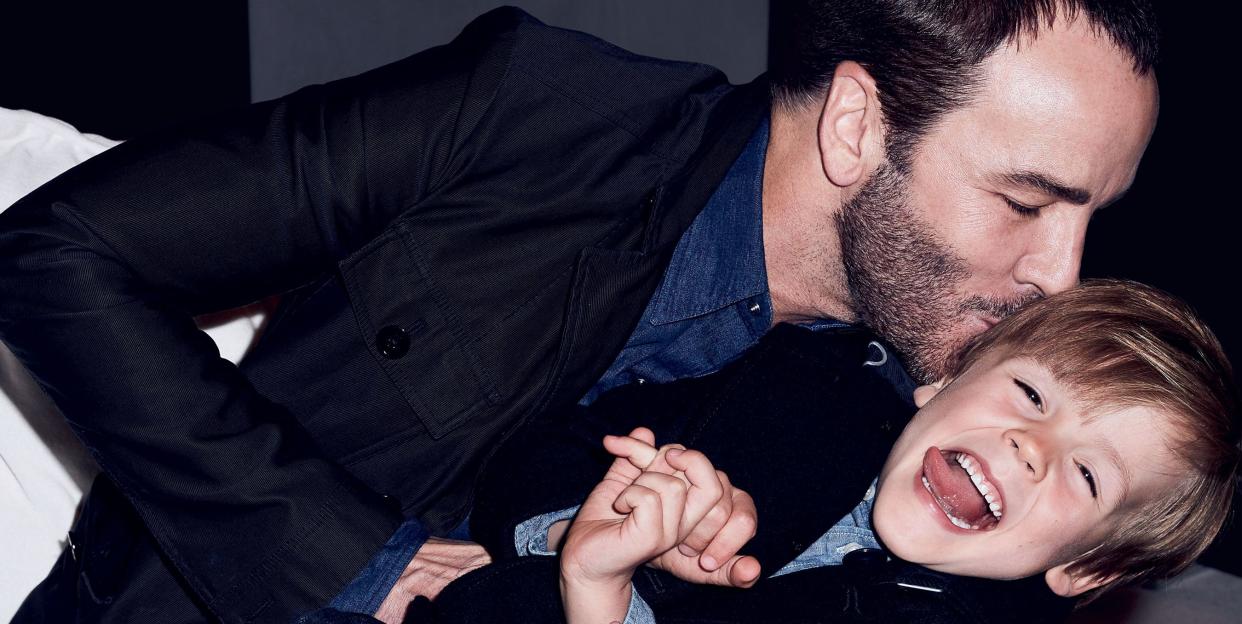Tom Ford on What His Son Taught Him

- Oops!Something went wrong.Please try again later.
"Hearst Magazines and Yahoo may earn commission or revenue on some items through the links below."
Purposeful.
Tom Ford is the personification of the word. Whether focused on fashion, filmmaking, or family, the designer acts with purpose. It was with purpose that Ford departed Gucci Group, after a stellar decade-long run, and launched parallel, hyperdemanding careers, reentering the fashion world under his own name and directing two critically acclaimed films. And it was with purpose that Ford undertook the making of his new book, Tom Ford 002—from which this essay is adapted—as he approached two milestones in rapid succession: the 15th anniversary of his eponymous label and his 60th birthday.
Ford distilled his vast archive of visuals into hundreds of high-gloss pages that capture a decade and a half of intense adventure and forward motion, including becoming a father in 2012, with his husband, Richard Buckley, to their son Jack. The book is dedicated to them both. (Poignantly, Buckley did not live to see its publication. He died in September after a long illness.)
“The main thing becoming a father did: You no longer see the world as finite with your life,” Ford says. “You see yourself as a link in a chain. That affects the way you think about everything.”
Eager to shed the stress and relentlessness of the fashion system, Ford left Gucci and Yves Saint Laurent in 2004, vowing that he was done with it all—basta, end of the Tom-Ford-the-designer story. He would go Hollywood. And so he did.
For true believers, though, fashion is magnetic. And well before Ford made his directorial debut, to critical acclaim with 2009’s A Single Man, the world from which he had so wanted a clean break pulled him back. In 2005, for the first time in his career, his name would be on the label, which called for intense consideration. He knew the stakes would be higher than ever.
“You have to think, What defines me?” Ford says.
Though he spent much time pondering the depth and nuance of that question, the overarching answer was obvious: glamour. A kind of glamour that exudes audacious sex appeal via inner attitude and outward chic. Only this would be more personal, the brand image conceived and honed from his own sensual persona—elegant, suave, a dash dangerous. He acknowledges the existence of two Tom Fords: “the billboard image and the reality.” He sees both as genuine in context but different in their daily actions and pursuits
Older and more temperate than in his Gucci days, the billboard Ford still radiates an impossible fusion of self-acquired material success and endless pursuit of pleasure. The real Tom Ford, though, has changed far more than his billboard alter ego. He retains the debonair aura, but his priorities have reformed around sobriety and a family-first core, with Jack’s school dropoff now as significant an outing as any black tie soiree.
Control is of high value to Ford. A natural pragmatist and planner, he meticulously considers all options before charting a course. Yet he is always open to a detour, or a full-on exit, as situations morph. Nothing has changed Ford’s life more than Jack’s arrival, and his son’s impact extends beyond life at home.
“I used to not think about the world in 2070. Now I do. Jack will be my age,” he says. “That doesn’t sound fashion-related, but it is. You’re seeing the culture change. This is a generational shift. So Babe Paley’s world, which I grew up looking at in the pages of W and which drew me to fashion, doesn’t mean anything to him. He won’t aspire to that kind of life; he won’t care. His generation won’t care. So having a child makes you very aware of that window moving on. It helps you see where the world is today, through the eyes of the next generation.”
Ford, who accepted the chairmanship of the Council of Fashion Designers of America a year before the Covid-19 pandemic hit with full force, expected to work on the retrospective book while continuing with the relentless demands of running a major global luxury brand, raising a child, and keeping an eye out for potential film projects. Then the world changed.
Pandemic fallout wrought devastation on fashion, as businesses of all sizes had to rethink everything: how, why, and with what to forge ahead in a stunned economy, and how to address a clientele whose mindset had likewise been shaken in every way—economically, psychologically, emotionally. The luxury goods industry suffered dramatically, but Ford’s own brand wasn’t his only concern. As CFDA chairman he had to help the organization’s membership navigate unprecedented disarray.
Through it all, Ford never wavered in his belief in fashion or formal consideration of it. Why fashion matters at all, let alone in times of distress, is a question long mused about by great thinkers and everyday people getting dressed every day. For Ford, the answer is both simple and profound. Fashion isn’t only about the joys of self-adornment and, through the manipulation of outward appearance, presenting our best selves to the world, though those benefits are essential. Rather, fashion is, at its most beneficial, a powerful distraction from the fate that awaits us all. “Fashion is a way of not feeling that one is mortal,” Ford says. He sees nobility in that distraction, calling it “beautifully life-affirming; it helps us to enjoy living in the moment.”
This story appears in the November 2021 issue of Town & Country. SUBSCRIBE NOW
You Might Also Like

